ballads
English Ballads
The Robin Hood Ballads
• The various ballads of Robin Hood are gathered into a collection called “The Geste of Robin Hood,” in which the whole life of the hero is portrayed. • Robin Hood, a legendary popular hero, is depicted in the ballads as a valiant outlaw, famous in archery, living under the greenwood tree with his merry men, taking from the rich and giv-ing to the poor, waging war against bishops and archbishops, and constantly hunted by the sheriffs, whom he constantly outwits.
• The subjects of ballads are various in kind, as the struggle of young lovers against their feudal-minded families, the conflict between love and wealth, the cruelty of jealousy, the criticism of the civil war, and the matters of class struggle. Of paramount importance are the ballads of Robin Hood.
英语诗歌分类
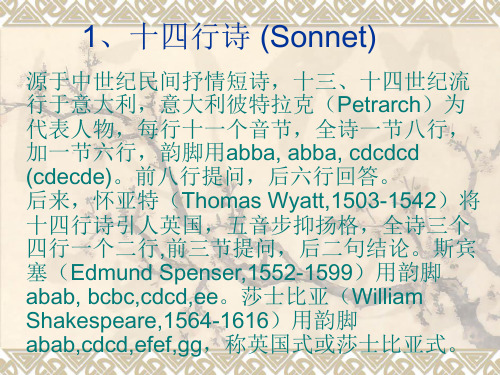
The Canterbury Tales---General Prologue
As soon as April pierces to the root The drought of March, and bathes each bud and shoot Through every vein of sap with gentle showers From whose engendering liquor spring the flowers; When zephyrs have breathed softly all about Inspiring every wood and field to sprout, And in the zodiac the youthful sun His journey halfway through the Ram has run; When little birds are busy with their song Who sleep with open eyes the whole night long Life stirs their hearts and tingle in them so, Then off as pilgrims people long to go, And palmers to set out for distant strands And foreign shrines renowned in many lands. And specially in England people ride To Canterbury from every countryside To visit there the blessed martyred saint Who gave them strength when they were sick and faint.
英国文学名词解释大全(整理版)
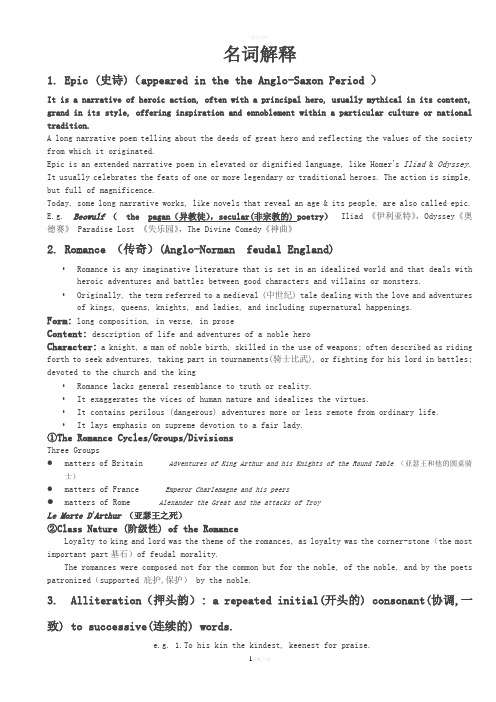
名词解释1.Epic(史诗)(appeared in the the Anglo-Saxon Period )It is a narrative of heroic action, often with a principal hero, usually mythical in its content, grand in its style, offering inspiration and ennoblement within a particular culture or national tradition.A long narrative poem telling about the deeds of great hero and reflecting the values of the societyfrom which it originated.Epic is an extended narrative poem in elevated or dignified language, like Homer’s Iliad & Odyssey.It usually celebrates the feats of one or more legendary or traditional heroes. The action is simple,but full of magnificence.Today, some long narrative works, like novels that reveal an age & its people, are also called epic.E.g. Beowulf ( the pagan(异教徒),secular(非宗教的) poetry)Iliad 《伊利亚特》,Odyssey《奥德赛》 Paradise Lost 《失乐园》,The Divine Comedy《神曲》2.Romance (传奇)(Anglo-Norman feudal England)•Romance is any imaginative literature that is set in an idealized world and that deals with heroic adventures and battles between good characters and villains or monsters.•Originally, the term referred to a medieval (中世纪) tale dealing with the love and adventures of kings, queens, knights, and ladies, and including supernatural happenings.Form:long composition, in verse, in proseContent:description of life and adventures of a noble heroCharacter:a knight, a man of noble birth, skilled in the use of weapons; often described as ridingforth to seek adventures, taking part in tournaments(骑士比武), or fighting for his lord in battles; devoted to the church and the king•Romance lacks general resemblance to truth or reality.•It exaggerates the vices of human nature and idealizes the virtues.•It contains perilous (dangerous) adventures more or less remote from ordinary life.•It lays emphasis on supreme devotion to a fair lady.①The Romance Cycles/Groups/DivisionsThree Groups●matters of Britain Adventures of King Arthur and his Knights of the Round Table (亚瑟王和他的圆桌骑士)●matters of France Emperor Charlemagne and his peers●matters of Rome Alexander the Great and the attacks of TroyLe Morte D’Arthur (亚瑟王之死)②Class Nature (阶级性) of the RomanceLoyalty to king and lord was the theme of the romances, as loyalty was the corner-stone(the most important part基石)of feudal morality.The romances were composed not for the common but for the noble, of the noble, and by the poets patronized(supported 庇护,保护) by the noble.3. Alliteration(押头韵): a repeated initial(开头的) consonant(协调,一致) to successive(连续的) words.e.g. 1.To his kin the kindest, keenest for praise.2.Sing a song of southern singer4. Understatement(低调陈述)(for ironical humor)not troublesome: very welcomeneed not praise: a right to condemn5. Chronicle《编年史》(a monument of Old English prose)6. Ballads (民谣)(The most important department of English folk literature )①Definition:A ballad is a narrative poem that tells a story, and is usually meant to be sung or recited in musical form.An important stream of the Medieval folk literature②Features of English Ballads1. The ballads are in various English and Scottish dialects.2. They were created collectively and revised when handed down from mouth to mouth.3. They are mainly the literature of the peasants, and give an outlook of the English common people in feudal society.③Stylistic (风格上) Features of the Ballads1. Composed in couplets (相连并押韵的两行诗,对句) or in quatrains (四行诗) known as the ballad stanza (民谣诗节), rhyming abab or abcb, with the first and third lines carrying 4 accented syllables (重读音节) and the second and fourth carrying 3.2. Simple, plain language or dialect (方言,土语) of the common people with colloquial (口语的,会话的), vivid and, sometimes, idiomatic (符合当地语言习惯的) expressions3. Telling a good story with a vivid presentation around the central plot.4. Using a high proportion of dialogue with a romantic or tragic dimension (方面) to achieve dramatic effect.④Subjects of English Ballads1. struggle of young lovers2. conflict between love and wealth3. cruelty of jealousy4. criticism of the civil war5. matters of class struggle7. Heroic couplet (英雄双韵体)(introduced by Geoffrey Chaucer)Definition:the rhymed couplet of iambic pentameter; a verse form in epic poetry, with lines of ten syllables and five stresses, in rhyming pairs.英雄诗体/英雄双韵体:用于史诗或叙事诗,每行十个音节,五个音部,每两行押韵。
英国文学史知识点

一、The Anglo-Saxon period (449-1066)1、这个时期的文学作品分类: pagan(异教徒) Christian(基督徒)2、代表作: The Song of Beowulf 《贝奥武甫》( national epic 民族史诗) 采用了隐喻手法3、Alliteration 押头韵(写作手法)例子: of man was the mildest and most beloved,To his kin the kindest, keenest for praise、二、The Anglo-Norman period (1066-1350)Canto 诗章1、romance 传奇文学2、代表作: Sir Gawain and the Green Knight (高文爵士与绿衣骑士) 就是一首押头韵的长诗三、Geoffrey Chaucer (1340-1400) 杰弗里、乔叟时期1、the father of English poetry 英国诗歌之父2、heroic couplet 英雄双韵体:a verse unit consisting of two rhymed(押韵) lines in iambic pentameter(五步抑扬格)3、代表作:the Canterbury Tales 坎特伯雷的故事(英国文学史的开端)大致内容:the pilgrims are people from various parts of England, representatives of various walks of life and social groups、朝圣者都就是来自英国的各地的人,代表着社会的各个不同阶层与社会团体小说特点:each of the narrators tells his tale in a peculiar manner, thus revealing his own views and character、这些叙述者以自己特色的方式讲述自己的故事,无形中表明了各自的观点,展示了各自的性格。
英国文学名词解释

Ballad(民谣)In more exact literary terminology, a ballad is a narrative poem consisting of quatrains of iambic tetrameter alternating with iambic trimester. Common traits of the ballad are that(a) the beginning is often abrupt ,(b) the story is told through dialogue and action (c) the language is simple or “folksy,”(d) the theme is often tragic---though comic ballads do exist, (e) the ballad contains a refrain repeated several times. The ballad became popular in England in the late 14th century and was adopted by many writers. One of the most important anthologies of ballads is F. J. Child’s The English and Scottish Popular Ballads. 在更为精确的文学术语中,民谣指的是抑扬格四音步与抑扬格三音步诗行交替出现的四行叙事诗。
民谣的共同特色包括:(a)诗歌的起首通常十分出其不意。
(b)故事通过对话和行为讲述。
(c)语言简单,民风十足。
(d)尽管存在喜剧民谣,但大多数民谣的主题具有悲剧意味。
(e)民谣通常包含重复多遍的叠句。
民谣这种诗歌形式在14世纪晚期的英格兰十分盛行,从此以后许多作家对其进行模仿创作。
英语诗歌的类别
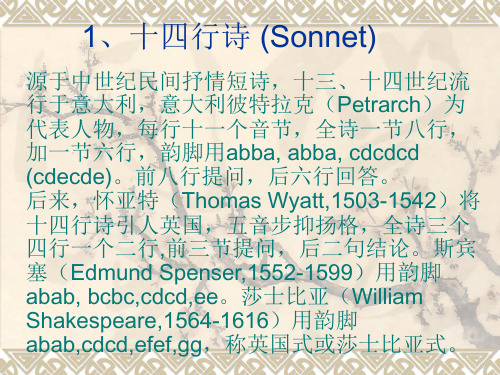
I celebrate myself, and sing myself, And what I assume you shall assume, For every atom belonging to me as good belongs to you. I loafe and invite my soul, I learn and loafe at my ease observing a spear of summer grass. My tongue, every atom of my blood, form’d from this soil, this air, Born here of parents born here from parents the same, and their parents the same, I, now thirty seven years old in perfect health begin, Hoping to cease not till death. Creeds and schools in abeyance, Retiring back a while sufficed at what they are, but never forgotten. I harbor for good or bad, I permit to speak at every hazard. Nature without check with original energy.
5、Epic poetry
it is a long verse narrative on a serious subject, told in a formal and elevated style, and centered on a heroic or quasi-divine figure on whose actions depends the fate of a tribe, a nation, or the human race. 史诗是叙述英雄传说和重大历史事件的叙事长诗。 一种庄严的文学体裁,内容为民间传说或歌颂英雄 功绩的长篇叙事诗,它涉及的主题可以包括历史事 件、民族、宗教或传说
ballad

4. Usually a compact little story, a single incident. 5. A multitude of subjects covering history,
legends, wars, love stories, family affairs, etc.
6. Simple words, plain language and dialogue
"Yesterday I should have married a maid, But she is now from me tane, And chosen to be an old knights delight,
Whereby my poor heart is slain.&or fee, But I will swear upon a book
Come drooping along the way.
The scarlet he wore the day before,
It was clean cast away; And every step he fetched a sigh,
"Alack and a well-a-day!"
民间流行的、富于民族色彩的歌曲,称为民
谣或民歌。民谣的历史悠远,故其作者多不 知名。民谣的内容丰富,有宗教的、爱情的、 战争的、工作的,也有饮酒、舞蹈作乐、祭 典等等。民谣既是表现一个民族的感情与习 尚,因此各有其独特的音阶与情调风格。如 法国民谣的蓬勃、意大利民谣的热情、英国 民谣的淳朴、日本民谣的悲愤、西班牙民谣 的狂放不羁、中国民谣的缠绵悱恻,都表现 了强烈的民族气质与色彩。
Introduction
Ballads(英国文学之歌谣)

The KeeperThe keeper would a-hunting go, and under his coat he carried a bow,All for to shoot at a merry little doe, among the leaves so green-o. (Chorus)Jackie Boy? — Master! — Sing ye well? — Very well!Hey down, — ho down, — derry derry downAmong the leaves so green—o.To my hey down down - to my ho down down —Hey down — ho down — derry derry downAmong the leaves so green—o.The first doe she did cross the plain, the keeper fetched her back again, Where she is now she may remain, among the leaves so green—o. (Chorus)The second doe did cross the brook, the keeper fetched her with his crook Where she is now you may go and look, among the leaves so green—o. (Chorus)* * * * *Blow the Candles OutHe:When I was 'prenticed in London, I went to see my dear.The candles were all burning, the moon shone bright and clear.I knocked upon her window to ease her of the pain.She rose to let me in, then she barred the door again.She:I like your well behavior and thus I often sayI cannot rest contented, love, while you are far away.The roads they are so muddy, we cannot gang aboutSo roll me in your arms love, and blow the candles out.He:But your father and your mother in yonder room do lie.She:Ah, they're huggin' one another, so why not you and I?A'huggin' one another without no fear or doubt,So roll me in your arms love, and blow the candles out!He: And if we prove successful, love, pray name him after me, And keep him neat and kiss him sweet, and daff him on your knee.When my three years are over, my time it will be out.Then I will double my indebtedness, by blowing the candles out!Mary HamiltonWord is to the kitchen gone,And word is to the hall,And word is up to Madam the Queen, And that‟s the wors t of all—That Mary Hamilton‟s borne a babeTo the highest Stuart of all. “Arise, arise Mary Hamilton,Arise and tell to meWhat thou hast done with thy wee babe I saw and heard weep by thee?”“I put him into a tiny boatAnd cast him out to seaThat he might sink or he might swim But he‟d never come back to me.”“Arise, arise Mary Hamilton,Arise and come with me.There is a wedding in Glasgow town This night we‟ll go and see.”She put not on her robes of blackNor on her robes of brown,But she put on her robes of whiteTo ride into Glasgow town.And as she rode into Glasgow town The city for to see,The bailiff‟s wife and the provost‟s wife Cried, “Ach, and alas for thee.”“Ah, ye need not weep for me,” she cried.“Ye need not weep for me,For had I not slain my own wee babe, This death I would not dee.“Ah, little did my mother thinkWhen first she cradled meThe lands I was to travel inAnd the death I was to dee.“Last night I washed the Queen‟s feetAnd put the gold in her hair,And the only reward I find for this—The gallows to be my share.“Cast off, cast off my gown,” she cried,“But let my petticoat be,And tie a napkin …round my face,For the gallows I would not see.”Then by and come the King himself, Looked up with a pitiful eye.“Come down, come down, Mary Hamilton. Tonight you‟ll dine with me.”“Ah, hold your tongue my Sovereign Liege And let your folly be,For if you‟d a mind to save my life,You‟d never have shamed me here.”“Last night there were four Marys,This night there‟ll be but three.There was Mary Beaton, and Mary Seton And Mary Carmichael and me.”。
英国文学复习总结
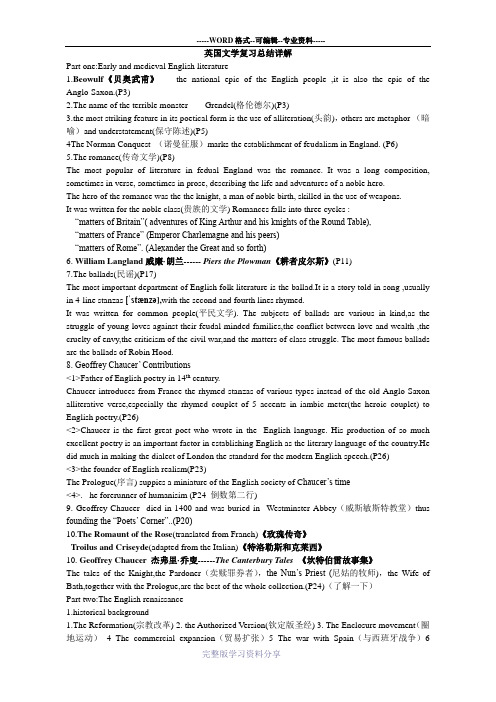
英国文学复习总结详解Part one:Early and medieval English literature1.Beowulf《贝奥武甫》------the national epic of the English people ,it is also the epic of the Anglo-Saxon.(P3)2.The name of the terrible monster------Grendel(格伦德尔)(P3)3.the most striking feature in its poetical form is the use of alliteration(头韵),others are metaphor (暗喻)and understatement(保守陈述)(P5)4The Norman Conquest (诺曼征服)marks the establishment of feudalism in England. (P6)5.The romance(传奇文学)(P8)The most popular of literature in fedual England was the romance. It was a long composition, sometimes in verse, sometimes in prose, describing the life and adventures of a noble hero.The hero of the romance was the the knight, a man of noble birth, skilled in the use of weapons.It was written for the noble class(贵族的文学) Romances falls into three cycles :“matters of Britain”( adventures of King Arthur and his knights of the Round Table),“matters of France” (Emperor Charlemagne and his peers)“matters of Rome”. (Alexander the Great and so forth)6. William Langland威廉·朗兰------ Piers the Plowman《耕者皮尔斯》(P11)7.The ballads(民谣)(P17)The most important department of English folk literature is the ballad.It is a story told in song ,usually in 4-line stanzas[ˈstænzə],with the second and fourth lines rhymed.It was written for common people(平民文学). The subjects of ballads are various in kind,as the struggle of young loves against their feudal-minded families,the conflict between love and wealth ,the cruelty of envy,the criticism of the civil war,and the matters of class struggle. The most famous ballads are the ballads of Robin Hood.8. Geoffrey Chaucer’ Contributions<1>Father of English poetry in 14th century.Chaucer introduces from France the rhymed stanzas of various types instead of the old Anglo-Saxon alliterative verse,especially the rhymed couplet of 5 accents in iambic meter(the heroic couplet) to English poetry.(P26)<2>Chaucer is the first great poet who wrote in the English language. His production of so much excellent poetry is an important factor in establishing English as the literary language of the country.He did much in making the dialect of London the standard for the modern English speech.(P26)<3>the founder of English realism(P23)The Prologue(序言)suppies a miniature of the English society of C haucer’s time<4>. he forerunner of humanisim (P24 倒数第二行)9. Geoffrey Chaucer died in 1400 and was buried in Westminster Abbey(威斯敏斯特教堂)thus founding the “Poets’ Corner”..(P20)10.The Romaunt of the Rose(translated from Franch)《玫瑰传奇》Troilus and Criseyde(adapted from the Italian)《特洛勒斯和克莱西》10. Geoffrey Chaucer 杰弗里·乔叟------The Canterbury Tales《坎特伯雷故事集》The tales of the Knight,the Pardoner(卖赎罪券者),the Nun’s Priest (尼姑的牧师),the Wife of Bath,together with the Prologue,are the best of the whole collection.(P24)(了解一下)Part two:The English renaissance1.historical background1.The Reformation(宗教改革)2. the Authorized Version(钦定版圣经)3. The Enclosure movement(圈地运动) 4 The commercial expansion(贸易扩张)5 The war with Spain(与西班牙战争)6Renaissance(文艺复兴)7 Humanism(人文主义)(P27-30)2.Thomas More托马斯·莫尔 Utopia《乌托邦》Utopia is More's masterpiece, written in the form of a conversation between More and a returned sailor.It is divided into two books.(P37)Book I of " Utopia" is a picture of contemporary social conditions of England.BookⅡwe have a picture of an ideal commonwealth (Utopia )in some unknown ocean.(P37)3. Thomas Wyatt(托马斯·韦阿特): He first introduced the sonnet into England from Italy.Surrey(萨里),in his tranlation Virgil’s Aeneid《埃涅伊德》,wrote the first English blank verse(无韵诗),later masrerly handled by Shakepeare and Milton.4 Philip Sidney(菲利普·锡德尼)Astrophel and Stella《爱星者与星星》Apology for Poetry《为诗辩护》5.WalterRaleigh(华尔特·罗利) Discovery of Guiaana《发现圭亚那》,Historty of the world6."the poets' poet" of the period was Edmund Spenser.T he Shepherd’s Calendar《牧羊人日记》,Epithalamion《新婚颂歌》,masterpiece The Faerie Queen 《仙后》7. The Faerie Queen《仙后》(P42)<1>Spenser’s grestest work,is a long poem planned in 12 books,he only finished 6.the work was dedicated to Queen Elizabeth.<2>each guest has a knight,each knight represents a virtue(美德),as Holiness(圣洁),Temperance(温和),Chastity(贞洁),Friendship,Justice (正义)and Courtesy(谦恭).<3>The knight as a whole symbolize England,the evil figures stand for his enemies,as King Philip of Spain,Mary Queen of Scots(both Catholics) or church of Rome.<4>The thoughts of the poem are nationalism,humanism,puritanism<5>The Faerie Queen is written in a special verse form ,consisits of 8 iambic pentameter lines followed by a ninth line of six iambic feet (an alexandrine亚历山大诗行),with the rhyme scheme abab bcbc c , the form called "Spenserian Stanza"(斯宾塞诗节) (P43)8.John Lyly(约翰·黎里)------Euphues《优弗依斯》was written in a peculiar style known as "Euphuism"(优弗依斯体或绮丽体)(P44)9. Francis Bacon(弗朗西斯·培根)the founder of English materialist philosophy(唯物主义) and modern science(P45)<1>Advancement of Learning《学问的演进》<2> New Instrument《新工具》---a statement of what is called the Inductive Method (归纳法)<3>Eassy《随笔》These essays cover a wide variety of subjects, such as love, truth, friendship, parents and children, beauty, studies, riches, youth and age, garden, death and many others. (P46)Of study《论读书》10.The Miracle Play(奇迹剧)(P46)The miracle were simply plays based on Bible stoies,such as the creation of the world,Noah(诺亚)and the flood, and the birth co Christ.They were at first performed in the churches.But after the actors introduced secular(世俗)and even commercial elements into the performance,it was forbidden inside the church ,so it got into the market place.11.Morality play(道德剧)(P47)A morality presented the conflict of good and evil with allegorical persons,such as Mercy(怜悯),Peace,Hate,Folly and so on.They contended for the possession of one’s soul.The morality was dreary performance with endless speech-making of those abstract characters.so into the plays Vice(恶习)who was the predecessor of the modern clown.12.The Interlude(插剧)13.The classical drama------comedy and tragedy14."University Wits"(大学才子) They were Lyly, Peele, Marlowe, Greene,Lodge and Nash). wrote for the stage of the time.15. Christopher Marlowe(克里斯托弗·马洛)t he most gifted of the "University Wits".(P50)Marlowe's best plays : Tamburlaine the Grea《帖木儿大帝》t, The Jew of Malta《马耳他的犹太人》and Doctor Faustus《浮士德博士》.(P51)The Tragical History of Doctor Faustus is Marlowe' s masterpiece.The doctor sold his soul to Devil so he may live 24 years in all voluptuousness.(P53)Marlowe's Literary Achievement(P55)<1>Marlowe was the greatest of the pioneers of English drama. He reformed the English drama and perfected the language and verse of dramatic works.<2>He first made blank verse(unrhymed iambic pentameter) the principal instrument of English drama.<3>Marlowe's dramatic achievement lies chiefly in his epical and at times lyrical verse.<4>His works paved the way for the plays of the greatest English dramatist –Shakespeare - whose achievements were the monument of the English Renaissance.16 Ben Jonson(本·琼森)--- V olpone, or the Fox, 《福尔蓬奈,或狐狸》The Alchemist.《炼金术士》,Every Man in His Humour《个性互异》,Bartholomew Fair《巴梭罗缪市集》(P94)William Shakespeare1. Shakespeare’s career may be divided into four major phrases which represent respectively his early, mature, flourishing, and late periods.(P60)详见课本2.His great ComediesA Midsummer Night's Dream《仲夏夜之梦》,The Merchant of Venice《威尼斯商人》,As You Like It《皆大欢喜》,Twelfth Night《第十二夜》are Shakespeare’s great comedies.3.The Character Analysis of Shylock 夏洛克人物形象分析He is greedy. He accumulates as much wealth as he can He is also cruel. In order to revenge, he would rather claim a pound of flesh from his enemy Antonio than get back his loan.他是贪婪的,竭尽全力敛财;他也是残忍的,为了复仇,宁愿割安东尼奥一磅肉用来偿还欠款。
Popular Ballads
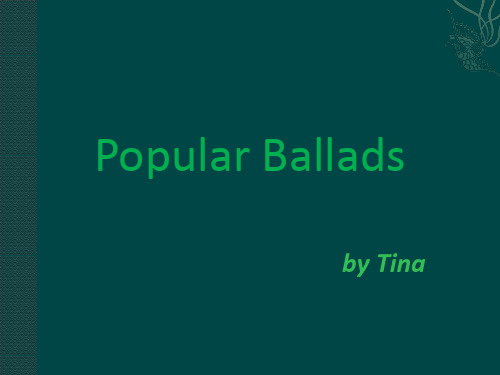
The three reached the church where Allin should keep his wedding. And they met the bishop who was presiding the wedding. After a long talk with the bishop, Robin pulled off his coat onto Little John and let Allin marry his true love.
Bishop Thomas Percy was among the first to take a literary interest in ballads, stimulated by his chance discovery of a 17th-century manuscript in which a number of them had been copied down among a great welter(混乱) of Middle English verse. The ballads he discovered were collected in Reliques of Ancient English Poetry《英诗辑古》. Robin Hood and Allin-a-Dale 罗宾汉和阿林代尔 Get Up and Bar the Door. 起来去关门 Sir Patrick Spens 派屈克.斯宾塞爵士
A bold outlaw Then Robin he hasted over the plain, he did neither stint nor lin.(He never stopped.)
英语诗歌的类别
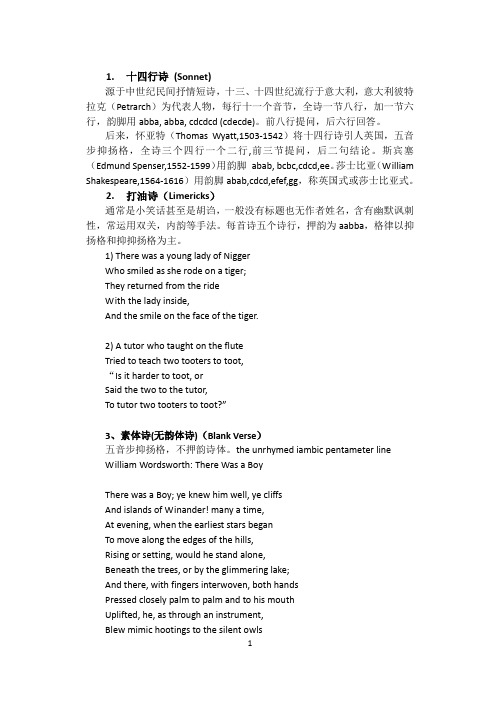
1.十四行诗(Sonnet)源于中世纪民间抒情短诗,十三、十四世纪流行于意大利,意大利彼特拉克(Petrarch)为代表人物,每行十一个音节,全诗一节八行,加一节六行,韵脚用abba, abba, cdcdcd (cdecde)。
前八行提问,后六行回答。
后来,怀亚特(Thomas Wyatt,1503-1542)将十四行诗引人英国,五音步抑扬格,全诗三个四行一个二行,前三节提问,后二句结论。
斯宾塞(Edmund Spenser,1552-1599)用韵脚abab, bcbc,cdcd,ee。
莎士比亚(William Shakespeare,1564-1616)用韵脚abab,cdcd,efef,gg,称英国式或莎士比亚式。
2.打油诗(Limericks)通常是小笑话甚至是胡诌,一般没有标题也无作者姓名,含有幽默讽刺性,常运用双关,内韵等手法。
每首诗五个诗行,押韵为aabba,格律以抑扬格和抑抑扬格为主。
1) There was a young lady of NiggerWho smiled as she rode on a tiger;They returned from the rideWith the lady inside,And the smile on the face of the tiger.2) A tutor who taught on the fluteTried to teach two tooters to toot,“Is it harder to toot, orSaid the two to the tutor,To tutor two tooters to toot?”3、素体诗(无韵体诗)(Blank Verse)五音步抑扬格,不押韵诗体。
the unrhymed iambic pentameter lineWilliam Wordsworth: There Was a BoyThere was a Boy; ye knew him well, ye cliffsAnd islands of Winander! many a time,At evening, when the earliest stars beganTo move along the edges of the hills,Rising or setting, would he stand alone,Beneath the trees, or by the glimmering lake;And there, with fingers interwoven, both handsPressed closely palm to palm and to his mouthUplifted, he, as through an instrument,Blew mimic hootings to the silent owlsThat they might answer him.—And they would shoutAcross the watery vale, and shout again,Responsive to his call,—with quivering peals,And long halloos, and screams, and echoes loudRedoubled and redoubled; concourse wildOf jocund din! And, when there came a pauseOf silence such as baffled his best skill:Then, sometimes, in that silence, while he hungListening, a gentle shock of mild surpriseHas carried far into his heart the voiceOf mountain-torrents; or the visible sceneWould enter unawares into his mindWith all its solemn imagery, its rocks,Its woods, and that uncertain heaven receivedInto the bosom of the steady lake.This boy was taken from his mates, and diedIn childhood, ere he was full twelve years old.Pre-eminent in beauty is the valeWhere he was born and bred: the churchyard hangsUpon a slope above the village-school;And through that churchyard when my way has ledOn summer-evenings, I believe that thereA long half-hour together I have stoodMute —looking at the grave in which he lies!3.自由诗(Free Verse)自由诗(Free Verse):现代诗中常见的体式,长短不同的诗行存在于同一首诗中,不讲究押韵与格律,只注重诗歌所表达的意象和传递的情感。
校园英语歌曲大全
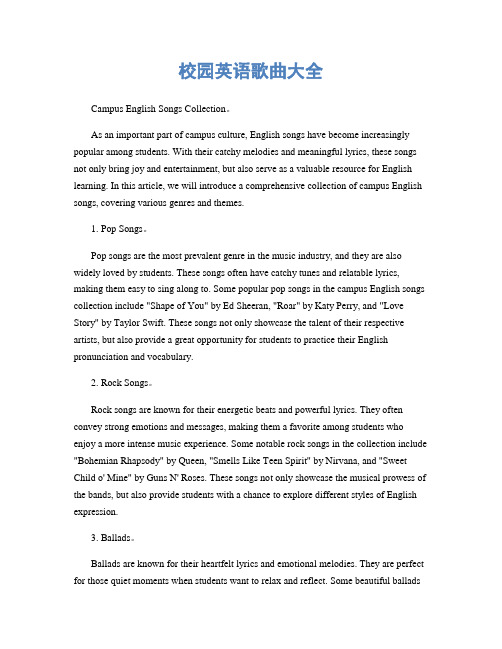
校园英语歌曲大全Campus English Songs Collection。
As an important part of campus culture, English songs have become increasingly popular among students. With their catchy melodies and meaningful lyrics, these songs not only bring joy and entertainment, but also serve as a valuable resource for English learning. In this article, we will introduce a comprehensive collection of campus English songs, covering various genres and themes.1. Pop Songs。
Pop songs are the most prevalent genre in the music industry, and they are also widely loved by students. These songs often have catchy tunes and relatable lyrics, making them easy to sing along to. Some popular pop songs in the campus English songs collection include "Shape of You" by Ed Sheeran, "Roar" by Katy Perry, and "Love Story" by Taylor Swift. These songs not only showcase the talent of their respective artists, but also provide a great opportunity for students to practice their English pronunciation and vocabulary.2. Rock Songs。
Part One Chapter Five The English Ballads 英国民谣
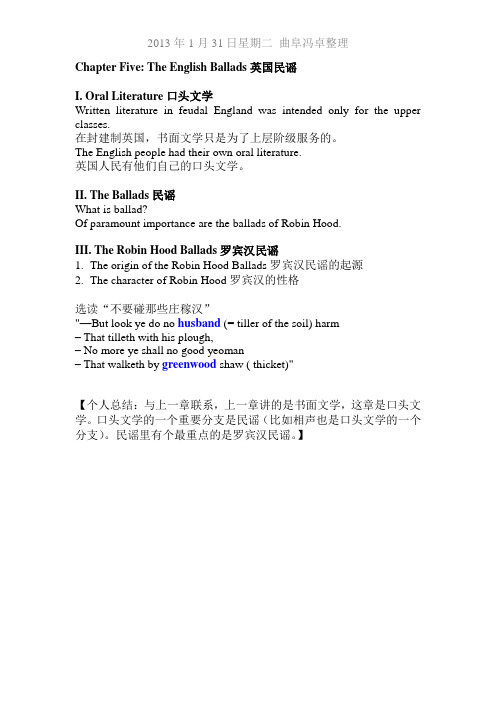
2013年1月31日星期二曲阜冯卓整理Chapter Five: The English Ballads英国民谣I. Oral Literature口头文学Written literature in feudal England was intended only for the upper classes.在封建制英国,书面文学只是为了上层阶级服务的。
The English people had their own oral literature.英国人民有他们自己的口头文学。
II. The Ballads民谣What is ballad?Of paramount importance are the ballads of Robin Hood.III. The Robin Hood Ballads罗宾汉民谣1.The origin of the Robin Hood Ballads罗宾汉民谣的起源2.The character of Robin Hood罗宾汉的性格选读“不要碰那些庄稼汉”"—But look ye do no husband (= tiller of the soil) harm– That tilleth with his plough,– No more ye shall no good yeoman– That walketh by greenwood shaw ( thicket)"【个人总结:与上一章联系,上一章讲的是书面文学,这章是口头文学。
口头文学的一个重要分支是民谣(比如相声也是口头文学的一个分支)。
民谣里有个最重点的是罗宾汉民谣。
】。
英语诗歌——精选推荐

英语诗歌Samples –type of poetryNARRATIVE (1)Epic (1)THE ILIAD (1)THE AENEID (2)Paradise Lost (2)Romances (3)Troilus and Criseyde (3)Idylls of the King (3)Ballads (4)The Wife of Usher’s Well (4)Robin Hood And Allin-A-Dale (5)LYRICS (5)Auld lang syne (5)Western Wind (6)Hark, Hark, the Lark (6)The Isles of Greece (6)THE DAFFODILS William Wordsworth (6)DRAMATIC (7)Hamlet (7)Julius Caesar (8)NarrativeEPICTHE ILIAD by Homer, translated by Samuel ButlerBOOK ISing, O goddess, the anger of Achilles son of Peleus, that brought countless ills upon the Achaeans. Many a brave soul did it send hurrying down to Hades, and many a hero did it yield a prey to dogs and vultures, for so were the counsels of Jove fulfilled from theday on which the son of Atreus, king of men, and great Achilles, first fell out with one another.THE AENEID by VirgilBOOK IArms, and the man I sing, who, forc'd by fate,And haughty Juno's unrelenting hate,Expell'd and exil'd, left the Trojan shore.Long labors, both by sea and land, he bore,And in the doubtful war, before he wonThe Latian realm, and built the destin'd town;His banish'd gods restor'd to rites divine,And settled sure succession in his line,From whence the race of Alban fathers come, And the long glories of majestic RomeO Muse! the causes and the crimes relate;What goddess was provok'd, and whence her hate; For what offense the Queen of Heav'n beganTo persecute so brave, so just a man;Involv'd his anxious life in endless cares,Expos'd to wants, and hurried into wars!Can heav'nly minds such high resentment show, Or exercise their spite in human woe?Paradise Lost by John MiltonBook 1Of Mans First Disobedience, and the FruitOf that Forbidden Tree, whose mortal tast Brought Death into the World, and all our woe, With loss of EDEN, till one greater ManRestore us, and regain the blissful Seat,Sing Heav'nly Muse, that on the secret topOf OREB, or of SINAI, didst inspireThat Shepherd, who first taught the chosen Seed, In the Beginning how the Heav'ns and Earth Rose out of CHAOS: Or if SION HillDelight thee more, and SILOA'S Brook that flow'd Fast by the Oracle of God; I thenceInvoke thy aid to my adventrous Song,That with no middle flight intends to soarAbove th' AONIAN Mount, while it pursues Things unattempted yet in Prose or Rhime.ROMANCESTroilus and Criseyde by Geoffrey Chaucer BOOK IThe double sorwe of Troilus to tellen, That was the king Priamus sone of Troye, In lovinge, how his aventures fellenFro wo to wele, and after out of Ioye,My purpos is, er that I parte fro ye. Thesiphone, thou help me for tendyte Thise woful vers, that wepen as I wryte!To thee clepe I, thou goddesse of torment, Thou cruel Furie, sorwing ever in peyne; Help me, that am the sorwful instrument That helpeth lovers, as I can, to pleyne! For wel sit it, the sothe for to seyne,A woful wight to han a drery fere,And, to a sorwful tale, a sory chere.Idylls of the King By Tennyson The Coming of ArthurLeodogran, the King of Cameliard,Had one fair daughter, and none other child; And she was the fairest of all flesh on earth, Guinevere, and in her his one delight.For many a petty king ere Arthur cameRuled in this isle, and ever waging warEach upon other, wasted all the land;And still from time to time the heathen host Swarmed overseas, and harried what was left.And so there grew great tracts of wilderness, Wherein the beast was ever more and more,But man was less and less, till Arthur came.For first Aurelius lived and fought and died,And after him King Uther fought and died,But either failed to make the kingdom one.And after these King Arthur for a space,And through the puissance of his Table Round, Drew all their petty princedoms under him.Their king and head, and made a realm, and reigned.BALLADSThe Wife of Usher’s WellThere lived a Wife at Usher’s Well,And a wealthy wife was she:She had three stout and stalwart sons,And sent them over the sea.They hadna been a week from her,A week but barely ane,When word came to the carlin wifeThat her three sons were gane.Robin Hood And Allin-A-DaleCome listen to me, you gallants so free, All you that love mirth for to hear, And I will tell you of a bold ourlaw That lived in Nottinghamshire.As Robin Hood in the forest stood,All under the greenwood tree, There he was aware of a brave young man As fine as fine might be.Lyrics --Auld lang syneBy Robert BurnsThe Should auld acquaintance be forgot, And never brought to min’?Should auld acquaintance be forgot,And days o’ lang syne?We twa hae run about the braes,And pu’d the gowans fine,But we’ve wandered mony a weary foot, Sin’ auld lang syne.We twa hae paidled I’ the burn,From morning sun till dine;But seas between us braid hae roared, Sin’ auld lane syne.And there’s a hand, my trusty fiere,And gie’s a hand o’ thine;And we’ll tak a right gude-willie waught, For auld lang syne.And surely ye’ll be your pint-stowp,And surely I’ll be mine;And we’ll tak a cup o’ kindness yet,For auld lang syne.For auld lang syne, my dear,For auld lang syne,We’ll tak a cup o’ kindness yet,For auld lang syne.Western WindWestern wind, when wilt thou blow,The small rain down can rain?Christ, if my love were in my arms,And I in my bed again!Hark, Hark, the LarkBy ShakespeareHark! Hark! The lark at heaven’s gate sings, And Phoebeus ‘gins arise,His steeds to water at those springsOn chaliced flowers that lies;And winkling Mary-buds beginTo ope their golden eyes.With every thing that pretty is,My lady sweet, arise;Arise, arise!The Isles of GreeceBy ByronThe isles of Greece, the isles of Greece!Where burning Sappho loved and sung, Where grew the arts of war and peace, Where Delos rose, and Phoebus sprung! Eternal summer gilds them yet,But all, except the sun, is set.THE DAFFODILSWilliam WordsworthI wander’d lonely as a cloudThat floats on high o’er vales and hills, When all at once I saw a crowd,A host , of golden daffodils;Beside the lake, beneath the trees, Fluttering and dancing in the breeze.Continuous as the stars that shineAnd twinkle on the Milky way,They stretch’d in never-ending lineAlong the margin of a bay:Ten thousand saw I at a glance,Tossing their heads in sprightly dance.The waves beside them danced, but theyOut-did the sparkling waves in glee:A poet could not but be gayIn such a jocund company!I gazed –and gazed –but little thoughtWhat wealth the show to me had brought:For oft, when on my couch I lieIn vacant or in pensive mood,They flash upon that inward eyeWhich is the bliss of solitude;And then my heart with pleasure fills,And dances with the daffodils.DRAMATICHamletBy ShakespeareHamlet:To be, or not to be, --- that is the question: Whether ’tis nobler in the mind to suffe rThe slings and arrows of outrageous Fortune,Or to take arms against a sea of troubles,And by opposing end them? To die, -- to sleep, -- No more; and, by a sleep, to say we endThe heart-ache, and the thousand natural shocks That flesh is heir to, --- ’tis a consummation Devoutly to be wish’d. To die, --- to sleep;--…Julius CaesarBy ShakespeareANTONY. Friends, Romans, countrymen, lend me your ears!I come to bury Caesar, not to praise him.The evil that men do lives after them,The good is oft interred with their bones;So let it be with Caesar. The noble BrutusHath told you Caesar was ambitious;If it were so, it was a grievous fault,And grievously hath Caesar answer'd it.Here, under leave of Brutus and the rest-For Brutus is an honorable man;So are they all, all honorable men-Come I to speak in Caesar's funeral.He was my friend, faithful and just to me;But Brutus says he was ambitious,And Brutus is an honorable man.He hath brought many captives home to Rome,Whose ransoms did the general coffers fill.Did this in Caesar seem ambitious?When that the poor have cried, Caesar hath wept;Ambition should be made of sterner stuff:Yet Brutus says he was ambitious,And Brutus is an honorable man.You all did see that on the LupercalI thrice presented him a kingly crown,Which he did thrice refuse. Was this ambition? Yet Brutus says he was ambitious,And sure he is an honorable man.I speak not to disprove what Brutus spoke,But here I am to speak what I do know.You all did love him once, not without cause; What cause withholds you then to mourn for him? O judgement, thou art fled to brutish beasts,And men have lost their reason. Bear with me; My heart is in the coffin there with Caesar,And I must pause till it come back to me.。
Popular Ballads

Stylistic Features of the Ballads
• The first feature is its simple language; the simplicity is reflected both in the verse form and the colloquial expressions. • The stories are intensely dramatic. They usually have a dominant mood or tone, either tragic like “Sir Patrick Spens” (派屈克·斯宾塞爵士) which tells a story of treachery, or comic like “Get up and Bar the Door” (起来,关上门) which presents a funny scene of the domestic life.
In this part, we’ll focus on
• Definition and Origin of Popular Balla of the Ballads • Types of the Ballads
Definition of Popular Ballads
Types of the Ballads
historical(历史类) legendary(传奇类) antastical(神话类) lyrical(抒情类) humorous(幽默类)
appreciation of the ballads
Get Up and Bar the Door
The dominant mood of the ballad is comic. It presents a funny scene of the domestic life. The husband and wife wants one another to shut the door against coldness, then they reach an agreement that the first one who speaks should go the bar the door. By selecting this scene as the subject matter, a comic effect is achieved.
Ballads of Ecclesiastes (《传道书》歌谣)

Journal of Literature and Art Studies, April 2018, Vol. 8, No. 4, 687-704doi: 10.17265/2159-5836/2018.04.016Ballads of Ecclesiastes (《传道书》歌谣)LIU Jian-fengSchool of Foreign Studies at Jiangnan University, Wuxi, China“Ballads of Ecclesiastes”, a group of 25 couplets and tercets written from Ecclesiastes in the Bible1. Everything Is MeaninglessThe words of the Preacher, song of David,King in Jerusalem:Meaningless, everything is meaningless,What does a man gain from his work on th’ earth?A man toils und’r th’ sun, but gains nothingness.Generations come, generation goeth,But th’ earth abides forever, one knows,Th’ sun rises, sets, to where it rose hasteth.To the south, then to the north the wind goes,It whirls ’bout continually, and you see,Returns again to the place where it blows.It ne’er gets full, all streams flow to the sea,The streams return to th’ place where they flowing, They go back to where they came from, know we.Our eyes never have enough of seeing,Things are wear’some too great for etymon,Our ears never hear enough of anything.Oh, what has been done is what will be done,And what has been is what will be anew,So there is nothing new under the sun.Nothing ’bout which one can say “Something new”, What has happened had already happened,And it was here already long ago.What has happened in th’ past is not recalled, 1. 万事皆虚空在耶路撒冷作王,大卫的儿子,传道者的言语:虚空虚空万事空,人生劳碌有何得?日下辛劳无用功。
EnglishBallads英语民谣

• Another feature of Robin's view is his reverence for the King. This reverence is found in the ballads side by side with the most outspoken attacks on the lay and ecclesiastical nobility. The King appears in the ballads as an intermediary between the outlaws and his officials and judges, as the humorous and understanding guest in the greenwood, feasting on his own mentary Reading: Robin Hood and the Bishop
– Come, gentlemen all, and listen a while, – Hey down down an a down – And a story I 'Ie to you unfold; – I 'Ie tell you how Robin Hood served the Bishop, – When he robbed him of his gold.
• Robin Hood, a legendary popular hero, is depicted in the ballads as a valiant outlaw, famous in archery, living under the greenwood tree with his merry men, taking from the rich and giving to the poor, waging war against bishops and archbishops, and constantly hunted by the sheriffs, whom he constantly outwits.
西方音乐类型介绍.docx
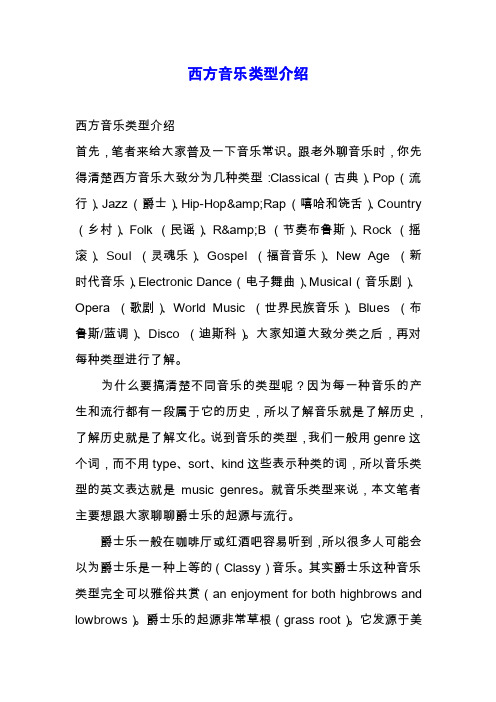
西方音乐类型介绍西方音乐类型介绍首先,笔者来给大家普及一下音乐常识。
跟老外聊音乐时,你先得清楚西方音乐大致分为几种类型:Classical (古典)、Pop (流行)、Jazz (爵士)、Hip-Hop&Rap (嘻哈和饶舌)、Country (乡村)、Folk (民谣)、R&B (节奏布鲁斯)、Rock (摇滚)、Soul (灵魂乐)、Gospel (福音音乐)、New Age (新时代音乐)、Electronic Dance (电子舞曲)、Musical (音乐剧)、Opera (歌剧)、World Music (世界民族音乐)、Blues (布鲁斯/蓝调)、Disco (迪斯科)。
大家知道大致分类之后,再对每种类型进行了解。
为什么要搞清楚不同音乐的类型呢?因为每一种音乐的产生和流行都有一段属于它的历史,所以了解音乐就是了解历史,了解历史就是了解文化。
说到音乐的类型,我们一般用genre这个词,而不用type、sort、kind这些表示种类的词,所以音乐类型的英文表达就是music genres。
就音乐类型来说,本文笔者主要想跟大家聊聊爵士乐的起源与流行。
爵士乐一般在咖啡厅或红酒吧容易听到,所以很多人可能会以为爵士乐是一种上等的(Classy)音乐。
其实爵士乐这种音乐类型完全可以雅俗共赏(an enjoyment for both highbrows and lowbrows)。
爵士乐的起源非常草根(grass root)。
它发源于美国南方黑人奴隶社区,美国黑人奴隶先玩起了布鲁斯,之后才玩起了爵士乐。
在爵士乐中,有一种旋律(melody)叫ballads。
Ballads指叙事抒情歌谣,ballads这种曲风就以叙事抒情为主(narrative and sentimental),舒缓而平和(smooth and peaceful),来源于黑人在田间地头的歌唱(field work songs)。
- 1、下载文档前请自行甄别文档内容的完整性,平台不提供额外的编辑、内容补充、找答案等附加服务。
- 2、"仅部分预览"的文档,不可在线预览部分如存在完整性等问题,可反馈申请退款(可完整预览的文档不适用该条件!)。
- 3、如文档侵犯您的权益,请联系客服反馈,我们会尽快为您处理(人工客服工作时间:9:00-18:30)。
The Characteristics of the Popular Ballads
• 1. A ballad usually tells a story, but most of them begin the story in an abrupt way; • 开 门 见山 • 多数 民 谣 一开头就叙述故事,而对故事的背景、 • 故事中的人物则极少有交待。如(Sir Patrick Spens)的第一节: p.54
• 民间流行的、富于民族色彩的歌曲,称为民谣或民 歌。民谣的历史悠远,故其作者多不知名。民谣的 内容丰富,有宗教的、爱情的、战争的、工作的, 也有饮酒、舞蹈作乐、祭典等等。民谣既是表现一 个民族的感情与习尚,因此各有其独特的音阶与情 调风格。如法国民谣的蓬勃、意大利民谣的热情、 英国民谣的淳朴、西班牙民谣的狂放不羁、中国民 谣的缠绵悱恻,都表现了强烈的民族气质与色彩。 英国民谣(English Ballad),起源于中世纪末期, 即12、13世纪,兴盛于14、15世纪,复兴于18、19 世纪,是英国最古老的诗歌形式之一。它主要包括 两大部分,英格兰民谣和苏格兰民谣。
• 开始 就 点 明所讲故事与海上航行有关,“血红 的洒” 既象征国王的残忍,又预示了故事的悲剧 结局。
2. There are strong dramatic elements; • 戏 剧 性强 • 民谣 的 戏 剧性主要通过两个方面来表现:一是 • 通过动作(Action),如“帕特里· 斯本上爵士”(Sir • Patrick Spens)中,当帕特里克· 士爵士收到国王要 他 • 开船起航的信后,他的反应是: • The first line that Sir Patrick read, • A loud lauch lauched he; • The next line that Sir Patrick read, • The tear blinded his ee. • 他心 中 的 矛盾通过一笑一哭的动作来表达,非
• 民谣的形式是多样的, 灵活的,而且与题材密 切相结合的.但最常见的最有影响的形式就是 一节四行,第一二行和第三四行各成一组,韵脚 落在第二行和第四行的末尾,第一行和第三行 稍长,各有四个重音;第二行和第四行稍短,各 有三个重音.
• There lived a wife at Usher’s well, • o 0 o 0 o 0 o 0 • And a wealthy wife was she; • o o 0 o 0 o 0 • She had three stout and stalwart sons • o 0 o 0 o 0 o 0 • And sent them o’er the sea. • o 0 o 0 o 0
Popular Literature
• Most of the written literature in feudal England was intended only for the upper classes. • The English people had a literature of their own, not written but oral, in the form of songs and ballads. • English folk songs had existed long before the Norman Conquest.
The publications of the ballads
• The English and Scottish ballads preserved today belong mostly to the 15th century. They were not collected or published till the second half of the 18th century when Bishop Thomas (1729-1811) introduced them to the world in his Reliques(遗俗) of Ancient English Poetry. Then Professor Francis James Child published a 5volume collection of English and Scottish Popular Ballads in 1882-89, containing 305 ballads, mostly of the 15th century. Imitations were also written, especially by the romantic poets of the early 19th century.
• Appearing in many parts of Europe in the late Middle Ages, ballads flourished particularly in Scotland from the 15th century onward. • Since the 18th century, educated poets outside the folk-song tradition—notably Coleridge and Goethe—have written imitations of the popular ballad’s form and style: Coleridge’s “Rime of the Ancient Mariner”(1798) is a celebrated example.
• --The Wife of the Usher’s Well
Varieties of themes a. matters of class struggle b. the border wars between England and Scotland c. conflict between love and wealth d. the cruel effect of jealousy and treachery e. the struggle of young lovers against their feudal families f. of humors g. some about supernatural ghost and spirits
The development of ballads
• The earliest of the existent English and Scottish popular ballads dated back to the 13th century; they flourished particularly in the 15th century; the later ones belonged to the 16th and even the 17th centuries; most of them were sung and circulated and then written down in the 15th century, but they were not collected nor published till much later.
Ballads
Definition: anonymous narrative songs that have been preserved by oral transmission. Whatever the origin, popular ballads were literature of common people. (a story told in song, usually in 4-line stanzas, with the 2nd and 4th rhymed.)
二是广泛用对话(Dialogue)来讲故事。 • Lord Randal • O where have you been, Lord Randal, my son ? • O where have you been, my bonny young man ? • I've been with my sweetheart, mother make my bed soon • For I'm sick to the heart and I fain would lie down. • …
பைடு நூலகம்
• What will you leave your brother, Lord Randal, my son ? • What will you leave your brother, my bonny young man ? • My horse and the saddle, mother make my bed soon • For I'm sick to the heart and I fain would lie down.
• A phrase, verse, or group of verses repeated at intervals throughout a song or poem, especially at the end of each stanza. • 副句,副歌:一个短语、一句诗或一组诗 句在一首歌或诗中每隔一段重复一次, 尤 其在每个诗节的结尾处
Ballad
• A folk song or orally transmitted poem telling in a direct and dramatic manner some popular story usually derived from a tragic incident in local history or legend. • The story is told simply, impersonally, and often with vivid dialogue. • Ballads are normally composed in quatrains with alternating four-stress and three-stress lines, the second and fourth line rhyming; but some ballads are in couplet form, and some others have six-line stanzas
